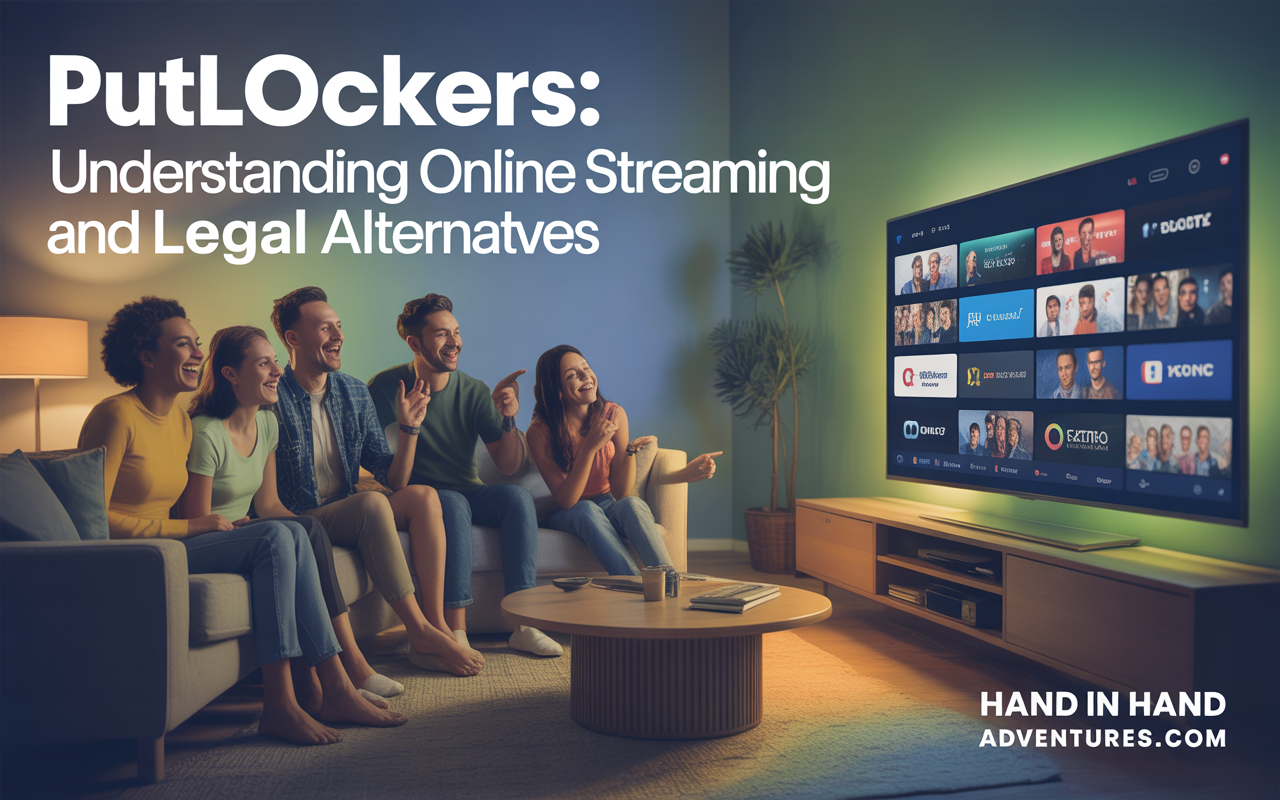Putlockers has long been a buzzword in the world of online streaming. Known for offering free access to movies and TV shows, it quickly gained massive popularity among viewers who wanted on-demand entertainment without subscription fees. However, as technology evolved, so did the scrutiny around such platforms. This article provides a comprehensive overview of Putlockers, examining its history, how it operates, the legal and ethical controversies it sparked, and the legitimate alternatives that ensure safe and lawful viewing experiences.
What is Putlockers?
Putlockers was an online streaming website that allowed users to watch films and television content for free. Originally launched in the early 2010s, it became one of the most visited sites globally, especially in regions where streaming subscriptions were expensive or unavailable. The site functioned by hosting links to third-party sources that streamed copyrighted content, often without proper licenses or permissions. Because of this, it was repeatedly taken down, only to reappear under new domains or mirror sites.
The Rise in Popularity of Putlockers
Putlockers’ rise was swift and global. The platform emerged during a time when digital streaming was still in its infancy and paid services like Netflix, Hulu, and Disney+ had limited catalogs or regional restrictions. People flocked to Putlockers because it offered immediate access to newly released movies and episodes. It required no registration, was free of cost, and offered a massive variety of titles. Consequently, Putlockers became a household name for anyone looking to watch the latest releases online.
How Putlockers Worked
Putlockers didn’t host the actual files directly. Instead, it functioned as an indexing site, providing links to streaming servers that contained the video content. Users clicked on these links and were redirected to third-party hosting sites, sometimes encountering promotions or references to platforms like royal x caisno along the way. Although this method gave Putlockers plausible deniability—since it wasn’t storing the content—it still facilitated unauthorized distribution of copyrighted material. This distinction did not protect it from being considered illegal in many jurisdictions.
The Legal Status of Putlockers
From a legal standpoint, Putlockers operated in a gray area that quickly turned black. Many governments and copyright enforcement agencies deemed it illegal because it enabled copyright infringement. Numerous countries—including the United States, the United Kingdom, and Australia—issued bans, blocking access to the main domain. Despite repeated shutdowns, new mirror sites and clones often surfaced under different domain names, continuing the cycle.
The Dangers of Using Illegal Streaming Sites
Using unauthorized streaming platforms like Putlockers carries significant risks. Beyond legal consequences, users expose themselves to security threats. Many of these sites are riddled with malicious ads, pop-ups, and hidden malware that can infect devices, steal personal data, or compromise privacy. Furthermore, such websites rarely have encryption or safety protocols, making users vulnerable to phishing or cyberattacks.
Why Authorities Target Sites Like Putlockers
Governments and law enforcement agencies target sites like Putlockers because they undermine the entertainment industry’s economic structure. Film studios, producers, and content creators lose billions in potential revenue each year due to piracy. Additionally, piracy discourages investment in creative industries. As a result, anti-piracy coalitions and copyright holders have become increasingly aggressive in pursuing legal actions, leading to domain seizures and hefty fines for operators.
The Ethics Behind Streaming Pirated Content
Ethically, using Putlockers raises questions about fairness and respect for creative work. Every movie, show, or documentary requires the effort of hundreds of people—writers, actors, technicians, and more. Consuming content without paying deprives them of rightful compensation. Supporting official channels ensures creators can continue producing quality entertainment and sustains the industry that millions depend on for their livelihoods.
Alternatives to Putlockers
Thankfully, several legitimate and affordable alternatives now exist for streaming movies and TV shows safely. Services like Netflix, Amazon Prime Video, Disney+, Hulu, and Apple TV+ offer vast libraries of high-quality content with proper licensing. Free legal platforms like Tubi, Crackle, and Pluto TV also provide ad-supported access to films and shows. Unlike Putlockers, these services ensure viewer safety and uphold copyright laws.
Subscription-Based Platforms Explained
Paid streaming services provide content legally by securing licenses from studios and creators. The monthly fees fund production, royalties, and distribution. While some users argue that subscriptions are costly, the reality is that competition among services has driven prices down while increasing quality and availability. Subscribing to one or two platforms typically costs less than the potential risks of malware or fines associated with illegal sites.
Free and Legal Streaming Options
For those unwilling or unable to pay, many legal options still exist. Platforms such as YouTube Movies, Plex, and Kanopy offer free or library-supported access to classic and independent films. These services generate revenue through ads rather than piracy, unlike searches that may lead users toward unrelated or risky offers such as royal x casino download. Such options prove that entertainment can be both accessible and ethical without resorting to unsafe alternatives like Putlockers.
VPNs and Online Safety Concerns
Some users turn to Virtual Private Networks (VPNs) to hide their identity while using illegal streaming sites. Although VPNs can improve online privacy, using them to access pirated content remains illegal in many jurisdictions. VPNs are best used for legitimate purposes—like protecting data on public Wi-Fi or bypassing regional restrictions on legal platforms. Misusing them to stream pirated content can still attract penalties.
The Role of Internet Service Providers (ISPs)
Internet Service Providers often collaborate with copyright enforcement agencies to block or monitor access to sites like Putlockers. When domains are blacklisted, ISPs restrict access or redirect users to legal alternatives. This coordinated effort has proven effective in reducing large-scale piracy, especially in countries with strict digital copyright laws.
The Evolution of Online Entertainment
Putlockers played a pivotal role in shaping how people consume digital entertainment. Its rise revealed the global appetite for instant, on-demand viewing. The backlash against it pushed legal streaming platforms to improve accessibility, affordability, and user experience. Consequently, the streaming landscape today—filled with diverse, high-quality options—owes part of its evolution to the demand once fulfilled by sites like Putlockers.
Technological Shifts and Market Adaptation
As technology advanced, so did the strategies of entertainment providers. High-speed internet, smart TVs, and mobile apps made legal streaming more convenient than ever. Subscription bundles, offline downloads, and personalized recommendations now attract audiences away from illegal sites. Companies also began producing exclusive content, known as originals, making their services more appealing.
Legal Actions and Shutdowns
Putlockers faced numerous lawsuits and takedowns over the years. Authorities seized domains, froze assets, and arrested site operators. However, the decentralized nature of the internet allowed clones and mirror sites to continue operating for some time. Still, as enforcement tightened and awareness grew, the influence of Putlockers gradually declined.
How Users Can Protect Themselves Online
To ensure safe streaming, users should prioritize security. Always choose legitimate streaming services that use HTTPS encryption. Avoid clicking on suspicious ads, pop-ups, or redirected links. Installing reliable antivirus software and using browser security settings also enhances protection. Moreover, being informed about copyright laws prevents accidental violations.
The Impact of Piracy on the Film Industry
Piracy undermines the financial backbone of the entertainment sector. Every illegal stream on Putlockers translates into lost revenue for filmmakers and reduced budgets for future projects. Independent filmmakers are particularly affected since they rely heavily on ticket sales and legitimate online purchases. As profits decline, job opportunities within the industry also suffer, creating a ripple effect across creative professions.
Educating Audiences on Responsible Streaming
Awareness plays a key role in combating online piracy. Schools, streaming companies, and government organizations increasingly promote digital literacy programs to educate users about the dangers of illegal streaming. By understanding the consequences, more viewers are choosing safe and ethical alternatives, ensuring a sustainable entertainment ecosystem.
Why Legal Streaming Is Worth It
Legal streaming platforms offer numerous benefits beyond legality. Users enjoy superior video quality, stable playback, and a wide range of content without intrusive pop-ups or malware risks. Moreover, watching content through legitimate means contributes to future productions, guaranteeing a continuous flow of fresh entertainment. Unlike Putlockers, these services respect both creators and consumers.
The Future of Digital Streaming
The decline of Putlockers marks a broader shift toward more regulated and ethical online entertainment. Future streaming models will likely merge technology, personalization, and affordability. Artificial intelligence may enhance user recommendations, while blockchain could secure intellectual property rights more effectively. As technology evolves, transparency and accountability will define the next generation of streaming services.
The Legacy of Putlockers
Though controversial, Putlockers left an undeniable mark on digital media history. It exposed the shortcomings of traditional distribution models and accelerated innovation in the streaming industry. Its story serves as both a cautionary tale and a catalyst for progress—a reminder that when access meets legality, everyone benefits.
Conclusion
Putlockers symbolizes a transformative yet controversial chapter in online entertainment history. While it provided free access to content, it also highlighted the risks, ethics, and consequences associated with digital piracy. In contrast, today’s legal streaming platforms offer safer, high-quality, and sustainable ways to enjoy films and shows. Supporting legitimate services ensures creators are rewarded for their efforts while protecting viewers from harm. Ultimately, understanding Putlockers reminds us that respect for intellectual property is not just a legal duty—it’s a cultural responsibility that shapes the future of entertainment.

